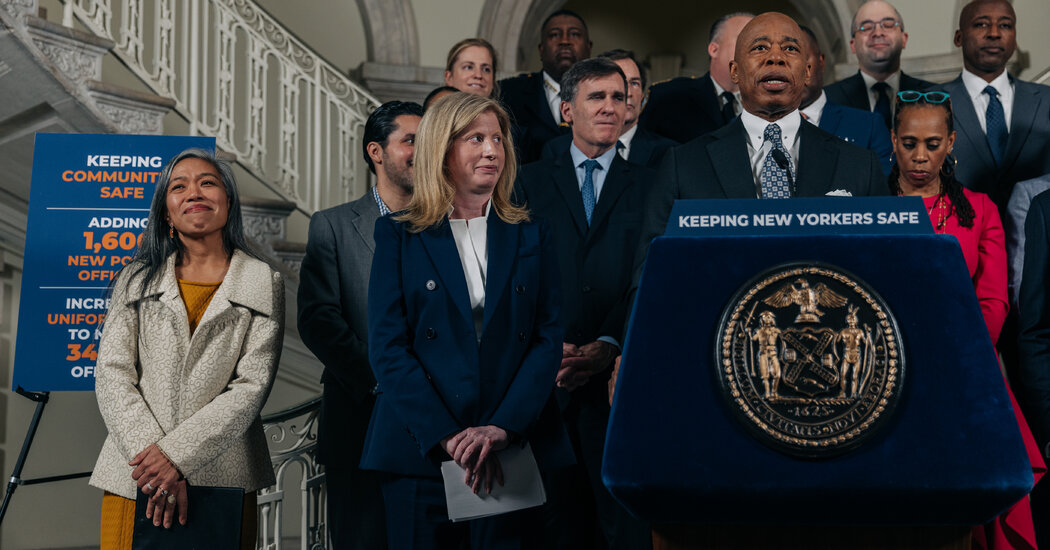In the 1890s, Theodore Roosevelt, then head of the board of police commissioners, scoured New York, reporters in tow, hunting officers in saloons and brothels in what he called “midnight rambles.”
More than half a century later, the Brooklyn district attorney uncovered graft so widespread it forced the resignation of the police commissioner and the former mayor, who had become ambassador to Mexico.
In the 1990s, a city commission rooted out the “Dirty 30,” officers in Harlem who had beaten up dealers and broken down their doors to steal cash and drugs.
Officials have been trying to tame corruption and misconduct in the Police Department for more than a century, but the problems that Commissioner Jessica S. Tisch inherited when she took over the department in November are especially thorny.
The current mess involves sprawling accusations of misconduct among high-ranking brass, as well as rampant overtime abuse and mismanagement. But she must solve it while reporting directly to the man who appointed her and elevated many of those leaders — Mayor Eric Adams, a former captain who is himself under federal indictment and is fighting for re-election this year.
In her seven weeks on the job, she has overhauled about half the executive staff — the high-ranking chiefs and commissioners who report to her. But she has also promoted a commander admired by Mayor Adams who is known for berating reporters and city officials on social media, raising questions about her independence.
Commissioner Tisch, 43, the former head of the Sanitation Department, is stepping into power at a tumultuous time. Federal agents seized files from the interim commissioner who preceded her, Thomas Donlon, and they took the phone of the commissioner before him, Edward Caban. Jeffrey Maddrey, who was the department’s top uniformed officer, is also under federal investigation after a lieutenant accused him of coercing her into sex in exchange for overtime opportunities.
The confluence of investigations “has got to be unprecedented or a new low for modern times,” said Daniel Richman, a Columbia University law professor and a former federal prosecutor in the Southern District of New York. It is also, he said, an “unprecedented opportunity” to make sweeping changes.
“With Adams under federal indictment and those he brought in to oversee and run the department under investigation, Tisch is unlikely to have to worry about heavy-handed interference from City Hall,” Mr. Richman said. She has “freedom to make bold personnel moves that in normal times would be impossible for an outsider.”
Commissioner Tisch has begun to aggressively shake up the nation’s largest police department, from high-level commanders to patrol officers. She said in an interview that she had replaced nearly a dozen chiefs and deputy commissioners, including the head of the Internal Affairs Bureau.
“Every police car says ‘courtesy, professionalism and respect,’” she said. “The leadership of the Police Department has to model that. I’m very confident that that direction is now clear.”
It was a statement that echoed a video message she sent throughout the roughly 50,000-employee department on New Year’s Day, when she vowed to restore “pride and honor” and said officers, not top brass, had been “leading the way” in setting a good example.
“The last few weeks have seen a challenging time for our department,” Commissioner Tisch told them. “Public scandal has led to a thoughtful and decisive shake-up among our executive staff.”
That included the resignation of Mr. Maddrey, an Adams ally. She also replaced the combative head of the department’s public information office, Tarik Sheppard, who sparred with reporters and other department leaders. Around the same time, she ordered the return of 600 officers whom chiefs and deputy commissioners had transferred without authorization from their regular assignments.
Another 400 were transferred so they could be redeployed to crime hot spots or understaffed parts of the department. Overtime pay for many of the officers had raised questions, Commissioner Tisch said.
The commissioner said she saw herself as a reformer. “I am not someone who accepts the status quo when the status quo doesn’t serve New Yorkers,” she said.
But one decision has drawn criticism — the promotion of John Chell from chief of patrol to chief of department, the highest-ranking uniformed position and supervisor of commanders and police operations. The elevation of Chief Chell, 56, who was close to Chief Maddrey, has led to questions about the continued influence of Mayor Adams, who has taken a keen interest in the department and has vested his political fortunes in its success.
Elizabeth Glazer, a former mayoral adviser to Bill de Blasio and the founder of Vital City, an online research journal, said that Commissioner Tisch “did exactly what had to be done.”
She called it “an incredible shot in the arm for the majority of the people in the department who have seen the disintegration of the department.”
But her decision to elevate Chief Chell was unsettling, Ms. Glazer said.
In 2008, Chief Chell, then a lieutenant and commander of an anti-theft unit, shot and killed Ortanzso Bovell, a man who was driving what police said was a stolen car. He said Mr. Bovell had backed the stolen car into him, causing his gun to fire accidentally and hit Mr. Bovell in the back. But following a civil trial in 2017, a jury found that the shooting was intentional. The jurors awarded Mr. Bovell’s family $2.5 million.
Most recently, Chief Chell’s online behavior has prompted questions over his temperament. Chief Chell has said he was using social media to defend officers and the department.
Ms. Glazer said that Chief Chell “seems to wear personal umbrage on his sleeve.” “That undermines her very clear direction that the executives at the highest levels act professionally, without fear or favor,” she said, referring to Commissioner Tisch.
This month, Mayor Adams spoke with Corey Pegues, a retired deputy inspector who now conducts online interviews and offers commentary on his YouTube channel. In the interview, Mr. Pegues called the shooting of Mr. Bovell “bad” and asked why Mr. Adams supported Chief Chell.
The mayor defended the commander, saying his background had been “vetted and analyzed.”
“You know him based on the encounter that you stated,” Mayor Adams said. “What I have seen over the two years that I have been here, I’ve seen a nonstop person.”
“He has served this city well,” he said. “I’m proud of the job he has been doing.”
Chris Dunn, the former legal director of the New York Civil Liberties Union, said Chief Chell’s appointment was “the most notable exception to the leadership housecleaning.”
“That may be the bargain Commissioner Tisch struck with the mayor,” he said. “But I’m betting we’ll see less bombast from him and a reduced public presence.”
For the past several months, Chief Chell has been quieter on social media, where he once ripped into politicians like Representative Alexandria Ocasio-Cortez and Councilwoman Tiffany Cabán. Lately, his posts have been reserved for officers making arrests and cracking crimes.
Commissioner Tisch said Chief Chell was a “proven crime fighter” whose strategies were part of the reason crime had declined.
“I’ve also made very clear my expectations around courtesy, professionalism, respect and dignity,” she said. “I am confident that the members of the executive staff will rise to meet those expectations.”
Commissioner Tisch said she “absolutely” felt free to pick her own executive staff members. She said she submitted the names of her candidates to City Hall, so they could be vetted as they were when she was head of sanitation.
“Of course, I’ve discussed them with the mayor,” she said. “But it is not meaningfully different.”
Mayor Adams will continue to have say over some appointments, said William Bratton, a former police commissioner who promoted Commissioner Tisch to deputy commissioner of information and technology when she first worked at the department.
“There is no denying the mayor is still going to have influence over the department,” Mr. Bratton said. “He’s going to rise and fall with whatever happens in that department in the next couple of months.”
Mr. Bratton said he admired Chief Chell’s focus on “quality of life” issues, such as arresting people driving illegal motorbikes and scooters — petty crimes that can lead to the perception that the city is out of control.
“I happen to like a lot of what Chell has done,” he said. “He’s controversial in his outspokenness, but Jessie has obviously decided that she can deal with that and maybe temper it.”
Peter Moskos, a professor at the John Jay College of Criminal Justice who teaches in a master’s program for police officials, said that for months, his students had been bemoaning the state of their agency. He began to hear murmurs of cautious hope in December, as the term wound down and Commissioner Tisch began making her changes, Mr. Moskos said.
“I’m a little more optimistic now,” he said, adding, “It’s hard to tell other cops to follow the rules when the leaders aren’t. ”
Kitty Bennett contributed research.





